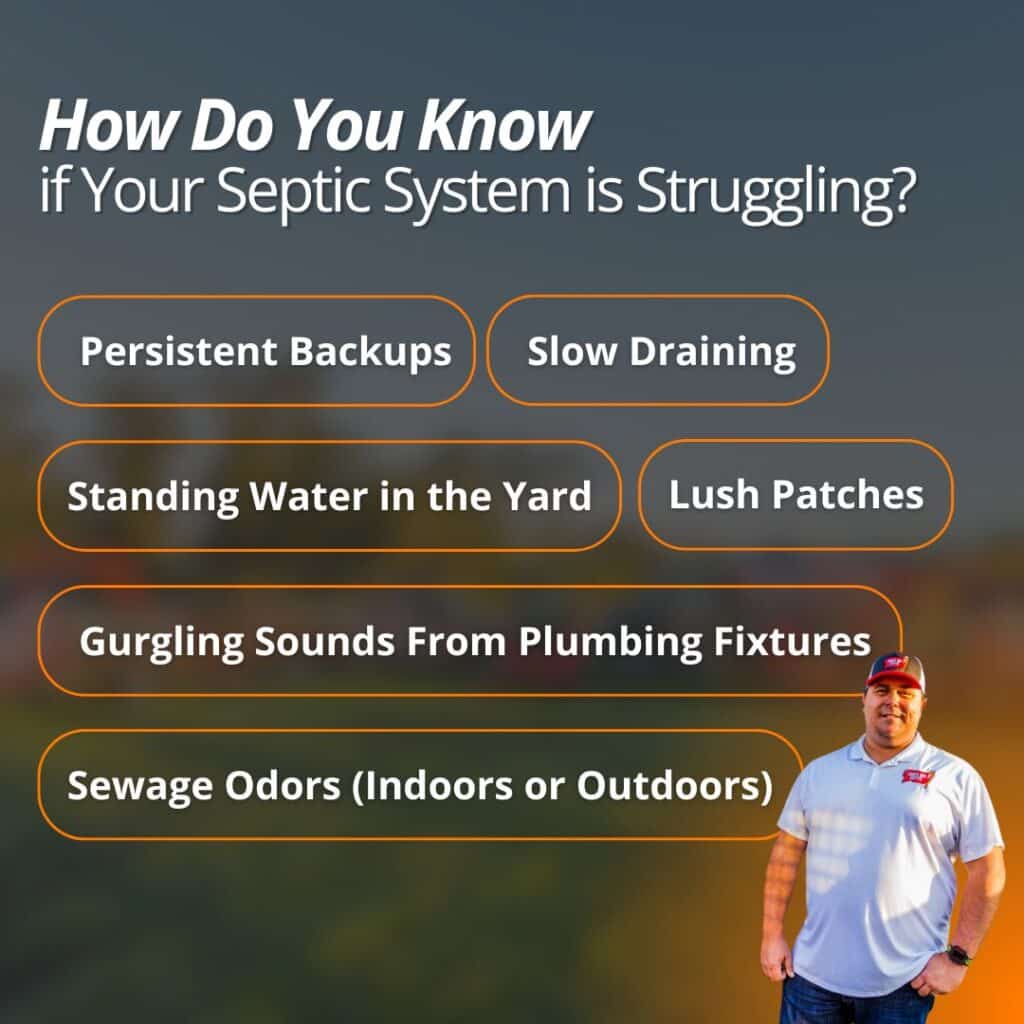In this guide, we’ll explain the septic system issues that seem simple but require professional care, why fixing yourself can backfire, and how calling a licensed septic provider like Tampa Bay Septic keeps your home safe and your system reliable.
When a septic system starts acting up, many homeowners wonder if they can handle the repair themselves. With endless online tutorials and hardware stores offering rental tools, the do-it-yourself option might look tempting.
But here’s the truth: fixing septic system problems is not a DIY project. The risks to your health, your property, and even your wallet are far too high. Septic systems are complex, and what looks like a small issue on the surface often points to a deeper problem underground.
The Complex Nature of Septic Systems
Septic systems aren’t just large tanks buried in the yard. Still, a national survey found that 55% of homeowners with septic systems initially believe their system will never need maintenance.
These systems are carefully designed to rely on a balance of biology, hydraulics, and engineering. Each part plays a role.
- The septic tank separates solids from wastewater.
- Bacteria inside the tank break down organic matter.
- Effluent filters keep solids from escaping into the drainfield.
- The drainfield disperses treated water safely into the soil.
If even one of these parts fails, the entire system suffers. Professional septic companies use specialized tools and training to diagnose issues, something most homeowners don’t have access to.

Septic Issues That Require Professional Attention
1. Persistent Backups or Slow Drains
If sinks, tubs, or toilets drain slowly, the problem could be deeper than a simple clog. It may signal a full septic tank, a blocked line, or even drainfield failure. Using chemical drain cleaners or snaking the line yourself can make things worse.
2. Sewage Odors Indoors or Outdoors
A strong sewage smell is more than a nuisance. It could indicate a cracked pipe, an overloaded tank, or leaks in the drainfield. Breathing in sewer gases can also pose health risks. Only professionals can safely trace and repair the source.
3. Standing Water in the Yard
If puddles appear near the septic system, wastewater may be surfacing because the drainfield is saturated. Walking through or attempting to dig around these areas exposes you to harmful bacteria. Professional inspections determine whether the problem is hydraulic overload or structural failure.
4. Gurgling Sounds in Plumbing Fixtures
Strange noises in toilets or drains may mean wastewater isn’t moving freely through the system. This could be caused by blocked venting, clogged pipes, or rising pressure inside the tank. Ignoring the problem may lead to a full system backup.
5. Unusually Lush or Green Grass Over the Drainfield
While a green lawn might look appealing, grass growing faster or thicker above the drainfield often signals leaks or effluent surfacing where it shouldn’t. This is an environmental hazard that requires immediate professional correction.
Why DIY Repairs Are Risky
Health Hazards
Raw sewage contains bacteria, viruses, and parasites. Exposure can lead to serious illness. Septic professionals wear protective gear and use equipment that keeps them safe while handling waste.
Environmental Damage
Improper fixes can push untreated wastewater into the soil or local waterways. The EPA notes that failing septic systems contribute to water pollution that affects drinking supplies and ecosystems.
Code and Legal Requirements
In Florida, septic repairs must follow state and county regulations. DIY attempts may violate these rules, leading to fines or required corrections later. Licensed professionals know local codes and ensure all work passes inspection.
Hidden Costs
What looks like a cheap DIY repair can quickly spiral into bigger expenses if it fails. For example, trying to fix a cracked pipe on your own could mask a larger drainfield issue. By the time it resurfaces, the repair costs are much higher.
The Cost of Getting It Wrong
Septic system replacements are among the most expensive home repairs. According to HomeAdvisor, a full replacement can cost anywhere from $3,600 to $12,400, depending on system size and soil conditions.
Regular maintenance and professional repairs cost far less. Having your septic system pumped every three to five years will cost you a few hundred bucks. That routine care helps prevent backups, prolongs the life of the system, and saves you from the massive expense of replacement.

What Professionals Do Differently
Septic companies bring more than experience. They have access to tools and tests that reveal what’s really happening underground.
- Video inspections to check for pipe cracks or blockages
- Soil testing to evaluate the drainfield absorption
- Tank inspections to measure sludge and scum layers
- Pressure tests to check hydraulic flow
With this information, they can recommend the right fix instead of guessing. Homeowners simply don’t have access to this level of insight without professional help.
Other Related Questions and Answers
What signs mean my septic tank needs pumping?
Slow drains, sewage odors, and gurgling pipes are common signs. Most tanks need pumping every three to five years, depending on household size and water use.
Does Tampa Bay Septic only handle repairs?
No. We provide inspections, pumping, maintenance, and new system installations across the Tampa Bay area. These services work together to keep septic systems healthy and reliable.
Can septic problems affect my home’s value?
Yes. A failing septic system can lower property value, delay sales, or scare off buyers. Having professional records of inspection and maintenance shows buyers the system is in good condition.
When to Call a Professional
The best time to call a professional is as soon as you notice early warning signs. Small issues rarely stay small with septic systems.
You should call Tampa Bay Septic for help fixing your system if…
- Your drains are slow despite routine care
- You notice sewage smells around the house or yard
- Water is pooling near the drainfield
- It has been several years since your last pumping
- You’re planning to sell your home and want to document system health
Tampa Bay Septic provides licensed inspections and repair services to homeowners throughout the region. With the right care at the right time, you can avoid emergency repairs and protect your home’s value.
Conclusion
Fixing septic system problems is not a job for DIY methods. From health hazards to costly mistakes, attempting your own repairs often creates bigger problems. Professional septic services ensure your system is safe, efficient, and long-lasting.
Contact Tampa Bay Septic today to schedule a septic inspection or repair. Our experts are ready to diagnose problems and keep your system working the way it should.
